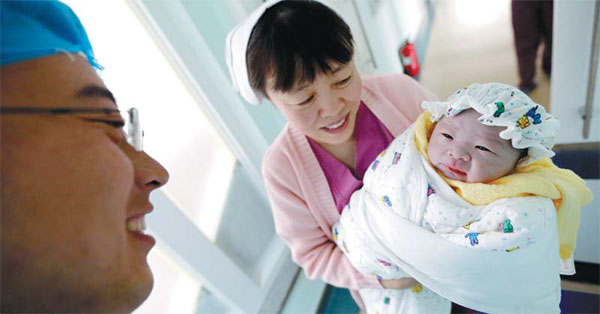Babies bloom in propitious years of the Chinese zodiac
|
A father admires his newborn at a hospital in Qingdao, Shandong province, on Sunday. He Haier / For China Daily |
Some obstetric medical workers in Beijing said they have seen an obvious increase of workload this year, and they partly attribute it to the traditional Chinese zodiac.
Zhai Guirong, a gynecologist working at a private hospital, said the hospital's obstetrics ward is booked and can't accommodate any more women who are expected to give birth before December.
"The Chinese zodiac has a great influence on the workload," she said.
Many more women gave birth at the hospital in 2012 - the Year of the Dragon - than in 2013, the Year of the Snake, she said.
This year, the Year of the Horse, is seeing a resurgence in pregnant women seeking help, she said.
"Pregnant women come to me asking whether their babies will be born in the Year of the Horse, and say they don't want them if they will be born the year after, which is the Year of the Sheep," she said.
Though lacking scientific evidence, some people who hold to traditional Chinese culture think that people born in the Year of the Sheep will have bad fortune during their lives.
The Chinese zodiac's influence on people's choices for giving birth is more obvious in private hospitals, since their obstetrics wards are often under less pressure than their public counterparts, said Zhai, who worked at the Beijing Obstetrics and Gynecology Hospital for more than 40 years.
There's time to notice the trend.
"Unlike private hospitals, the obstetrics departments of large public hospitals in Beijing are always running at full capacity. They can't tell much difference between the workload of different years," she said.
However, the zodiac may have played its role in 1991, another Year of the Sheep, when she was working at the Beijing Obstetrics and Gynecology Hospital.
"More than 2,000 babies were born in 1991 at the hospital, while the number was more than 3,000 in 1990 and more than 4,000 in 1992," she said.
Gu Yueshan, head of Tongzhou Maternal and Child Health Hospital in Beijing's Tongzhou district, said he has noticed a similar trend.
The number of babies born in the hospital from January to April increased by 29.4 percent from that of the same period last year, and the average number of patients visiting the hospital's obstetric department reached 800 a day, he said.
"Only an average of 500 to 600 patients visited the department per day last year."
Also, the number of women registered at his hospital for maternal checks and childbirth so far this year has increased by more than 30 percent over the same period last year, he added.
Part of the reason for the increase, Gu reckoned, is that many want to give birth in the Year of the Horse rather than the Year of the Sheep.
Another possible cause of the increase may be the city's policy change early this year allowing couples to have a second child if either parent is an only child, he said.
wangqingyun@chinadaily.com.cn

























